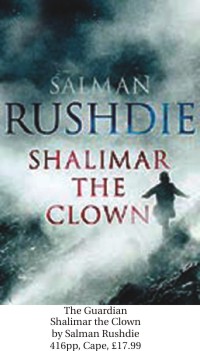|
Book Review
The Children of
Paradise
Salman Rushdie misses out the appeal of the ordinary in his continent-crossing new novel, Shalimar the Clown, says Natasha Walter
Even before you start this novel, you are aware that it is an important book. The status of Salman Rushdie as a writer has hardly waned, despite the disappointments of his last two novels, and his status as a totemic figure for those who support freedom of expression in an increasingly divided world will never wane. This novel has been billed as his response to the threat of fundamentalism; it is hard to imagine a more imposing subject.
 But from the beginning the prose seems to be straining to live up to expectations, and slipping into hyperbole as a result. In the first few pages our heroine, the beautiful India Ophuls, meets up with her father, the powerful ambassador Max Ophuls: "He was the high priest of the golden bough. He inhabited his enchanted grove and was adored." When she looks into the eyes of her father's new driver, Shalimar, the rhetoric becomes even more inflated: "He came, he said in halting reply to her enquiry, from Kashmir. Her heart leapt. A driver from paradise. His hair was a mountain stream. There were narcissi from the banks of rushing rivers and peonies from the high meadows growing on his chest ... " But from the beginning the prose seems to be straining to live up to expectations, and slipping into hyperbole as a result. In the first few pages our heroine, the beautiful India Ophuls, meets up with her father, the powerful ambassador Max Ophuls: "He was the high priest of the golden bough. He inhabited his enchanted grove and was adored." When she looks into the eyes of her father's new driver, Shalimar, the rhetoric becomes even more inflated: "He came, he said in halting reply to her enquiry, from Kashmir. Her heart leapt. A driver from paradise. His hair was a mountain stream. There were narcissi from the banks of rushing rivers and peonies from the high meadows growing on his chest ... "
But when India sees her father being murdered in broad daylight by this same Shalimar, the top-volume rhetoric quietens down. At this point we get to hear the beat of something more moving in India's head as she sits, shocked and silent, remembering her love for her father. We then flip into the entangled back stories of Shalimar and Max Ophuls, and begin to glimpse the novel's ambition: how it will use this personal tragedy to interrogate the political and religious tragedies of the modern world.
So here, first of all, is a paradise, Kashmir, "bathed in the relentless clarity of mountain sunlight", where a young Hindu woman, Boonyi Kaul, loves a young Muslim man, Shalimar. Although the two marry across the religious divide, the seeds of intolerance have already been sown in Kashmir, fostered by the overlapping ambitions of the Indian army and the Islamic fundamentalists. Tragedy is set in motion with the appearance of Max Ophuls, the Jewish American ambassador to India, who falls for the lovely Boonyi, and takes her off to Delhi. Meanwhile the forces of Islamic fundamentalism feed on Kashmir's lost innocence, channelling the anger of poor cuckolded Shalimar into the outlet of terrorism. The other result of this imbroglio is Boonyi's daughter, who is taken to the west by Max's cold, aristocratic British wife; that girl is India Ophuls.
Once we get through this vast flashback and return to the point of the murder we realise what was hidden from us the first time it was played out: the grand symbolism of the act. So the resentful Muslim, in revenge for what he sees as the corruption wreaked by the west, is being used by greater political forces to try to cut down the American Jew; leaving in his wake a confused individual, neither western or eastern, who is nevertheless determined to understand and to survive.
Rushdie has previously made his characters' fates mirror the fates of nations: Midnight's Children brilliantly wove the conceit of the child born at the moment of India's independence, entangling his desires and disappointments with those of India itself. But that was a humane novel in which the parallels to wider stories never weighed down the characters. The characters in Shalimar the Clown, by contrast, are almost crushed by the freight of nations that they carry around on their shoulders. If you're prepared to take this novel as an impassioned lecture on the roots of violence and the awful fate of Kashmir, it can work powerfully. But lose sight of the lecture, and you are left with an increasingly absurd plot and a style that is more and more mannered.
 The best parts of the novel are undoubtedly those set in Kashmir; Shalimar and Boonyi's youth and family background are realised with humour and sensual detail. And the destruction of Kashmir is the true heart of this book. When dealing with that tragedy Rushdie's style is genuinely passionate; this is a paean of love to a destroyed homeland. By contrast, when Rushdie journeys into the past of Max Ophuls the tale becomes coldly decorative. We are taken to Strasbourg at the oubreak of the second world war, where Ophuls escapes across enemy lines and seduces a German military assistant; but history is here being used merely as an excuse for some highly coloured yarn-spinning. The best parts of the novel are undoubtedly those set in Kashmir; Shalimar and Boonyi's youth and family background are realised with humour and sensual detail. And the destruction of Kashmir is the true heart of this book. When dealing with that tragedy Rushdie's style is genuinely passionate; this is a paean of love to a destroyed homeland. By contrast, when Rushdie journeys into the past of Max Ophuls the tale becomes coldly decorative. We are taken to Strasbourg at the oubreak of the second world war, where Ophuls escapes across enemy lines and seduces a German military assistant; but history is here being used merely as an excuse for some highly coloured yarn-spinning.
One metaphor running throughout is Shalimar's tightrope-walking talent, reprised when he starts to work as an international terrorist. "He remembered his father teaching him to walk the tightrope, and realised that travelling the secret routes of the invisible world was exactly the same." Max Ophuls thinks similarly of his double identity during the war: "Entering the Resistance was, for me, a kind of flying ... One lifted oneself away from one's life." Flying and tightrope-walking are the ideal images for a book in which history becomes one enormous, highly coloured pattern seen from above. "Everywhere was now a part of everywhere else," we learn in the first chapter. "Our lives, our stories, flowed into one another's, were no longer our own."
But even if our lives flow into one another's, they do in fact still feel like our own, day by day. This individual ordinariness is what escapes Rushdie in this book, and the problem becomes particularly acute when we are left with India Ophuls at the end. Her grand destiny is to confront all the horrors of the past, and she symbolically renames herself Kashmira. But the problem with a character who is not allowed to be just an ordinary person is that she may turn out to be not even that. Although Rushdie has complained that people read his novels as being partly autobiographical, in fact that is the reading that gives this book most resonance. Because if we read the last pages as being about India/Kashmira, they are hopelessly unaffecting, but if we see them as Rushdie's song both of sadness and of hope for himself and his world, then they have more power to move us.
· Natasha Walter is the author of The New Feminism (Virago)
This article was first published in the Guardian. Copyright
(R) thedailystar.net 2005 |
